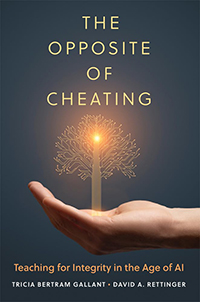
Designing for Integrity
The Opposite of Cheating: Teaching for Integrity in the Age of AI by Tricia Bertram Gallant & David A. Rettinger
University of Oklahoma Press, January 1, 2025
"Cheating is a natural and normal human behavior, most often enacted as a way to survive or as an error in judgment," write Tricia Bertram Gallant and David A. Rettinger in their forceful The Opposite of Cheating: Teaching for Integrity in the Age of AI. Cheating is not typically "something students do to intentionally dupe, deceive, or insult" their instructors. With the advent of ChatGPT and other AI tools, however, student cheating has certainly taken on thorny, new dimensions in both higher and secondary education. Gallant and Rettinger acknowledge this reality while offering a number of specific recommendations for teachers and school leaders. In seven research-packed chapters, they explain why students cheat; how to center integrity in course syllabi and daily pedagogical practices; how to design courses and assessments for integrity; how to promote and protect assessment integrity; and how to infuse ethics into all elements of teaching and learning in the age of AI. Although framed within the context of managing and contending with AI, their book acts more like a primer on how to approach student cheating through the lens of teaching and learning. Gallant and Rettinger are not only great researchers and writers, but also skilled teachers, made evident through their articulation of specific learning goals and their comprehensive lists of next steps for educators to lean on as they transition from the book back to their real world of their own practice.


